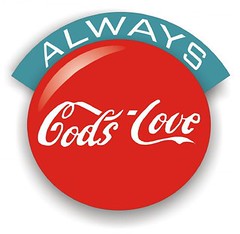God Loves You, You Know It
A lot of you contributed thoughts about how you know God loves you.
There was a wide array of heartfelt remarks, and I appreciate every one of them. The majority of you had either one dramatic ah-ha moment when you felt absolutely certain of God's love, or you have experienced that certainty over years of smaller epiphanies.
One of you was taught by your Universalist church that God IS love, and has determined through logical reasoning that this is indeed true, having tested and rejected other conceptions of God as cosmic judge, or punishing parent.
A few of you don't believe in a personal God, but one of you stated with comfortable simplicity that you know the forces of God are working in the universe as surely as you know that the force of gravity is working in the universe.
One of you believes in a loving God on many days, and on other days adopt a more existential position of biological determinism that doesn't feel very inspiring, but may just be the reality of human existence ( to which I say, hey, there could be worse things than being biologically programmed to respond to stimuli like love!).
Two of you responded at length on your own blogs. Yay! Follow the links, people, and enjoy.
Someone suggested something I have long embraced on my most dubious days, which is that if I love God's creation (and I certainly try to), I must include myself in that love. This resonated very strongly with me.
Another reader shared some deep doubts about some of the essential claims made by liberal religion, saying, "I am a part of a liberal religion because it's the way I think things should be, but that doesn't mean I believe it. " I found this comment intriguing and honest, and had the sense that many of us would like to hear more about these ideas if Jason was willing to write more about them. Even as I constantly beat the drum of "we have to know what we AFFIRM as religious liberals!" I think it's also important for us to be able to discuss, among ourselves, the doubts and struggles we have with our own faith claims. Jason may have begun an important conversation there. He says, "I live my life with integrity and hope that's good enough." I think we can all agree that to live with integrity is one of the highest aims of liberal religion.
One respondent is disturbed that modern people persist in believing in "a being that has no humanly measurable attributes" (by which I think he means God), but advises us to believe that we are loved because to do so may very well be good for our character formation. I found this last twist surprising and rather endearing.
Anyone else want to weigh in?




6 Comments:
I wondered whether the person so insistent on direct experience believes, say, that George Washington existed.
But I didn't want to befoul your thread with snark and argument.
OK, I wanted to, but I didn't.
CC
Since I believe deeply in two different concepts of God--- Martin Buber's I-Thou and Wieman's creative interchange--- in that God is relationship, and we work to constantly experience deep relationships...
I experience God through relationship, and as a result, I believe God does love me, since I have experienced other people loving me.
Dame O
I've long been influenced by process theology and its associated panentheism, and I have liked the idea that God loves us because we are included within God, and that God expresses her love for us by offering us the possibilities for enhancing our experience. The other side of this is that because we are within God, God is dependent on us (a strange concept for traditional theism to handle!) and that we actually enhance God's experience by our own actions. I also like the idea of objective immortality, that says that we are objectively immortalized in God, so that God eternally incorporates everything we have experience, and that we live on through God objectively (rather than subjectively). So we can express our love for God by immortalizing ourselves within God the best way that we can, by being the best we can be and responding to God's offerings the best that can.
Anyway, that's mytake on it.
Mystical, I think that the idea that God is dependent on us can also be found in Judaism... or at least the idea that God needs us to worship "Him."
I hope everyone went to your site and read those intense and sad and hopeful and longing posts from a few years ago, CK. They provide that rare glimpse into how we individually struggle with the specifics of theological tradition, and how hard a road they can take us down.
Oh, I believe in George Washington and that I can experience him through the things he has done. But any theist would say the smae about God.
My point was that I don't think there's any experience-only-based belief system that would allow someone to believe in George Washington and not God.
CC
Since you found the comments intriguing I did elaborate here.
It's John, by the way.
Post a Comment
<< Home